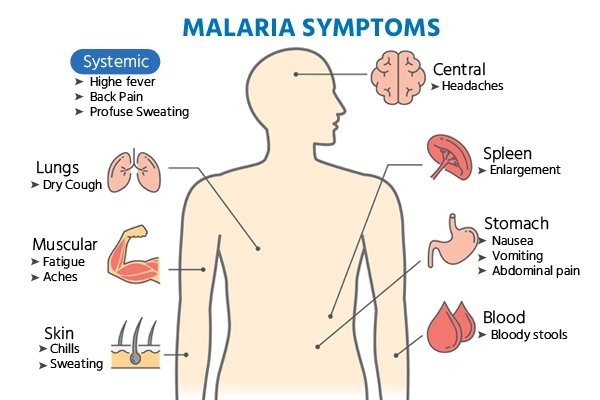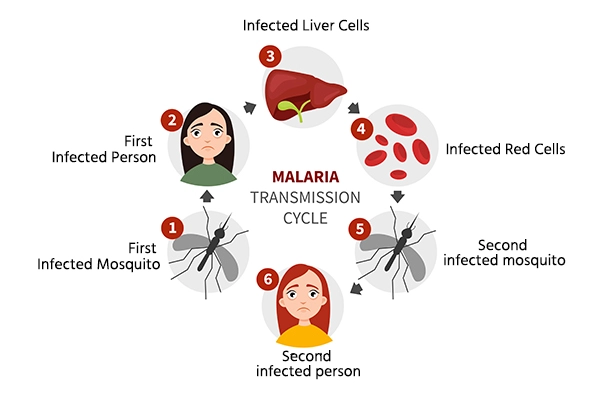What Is Malaria? - Symptoms, and Prevention
Written by Medicover Team and Medically Reviewed by Dr Girish Loya , General Medicine
Malaria is a life-threatening mosquito-borne disease caused by the Plasmodium parasite. It infects humans through the bite of infected female Anopheles mosquitoes. Malaria is caused by five parasitic species, two of which P. falciparum and P. vivax, are the most dangerous to humans.
The malaria parasite Plasmodium falciparum is the deadliest and most common in the African continent. According to a report, India accounts for 3% of the worldwide malaria burden, resulting in 2 million confirmed cases per year. One may need to take medications before, during, and after the travel to lower the risk of contracting malaria.
If left untreated, malaria can lead to severe complications such as organ failure and death, particularly in children and pregnant women.
Prevention strategies include mosquito control measures like bed nets and insecticides, as well as antimalarial medications. Despite global efforts, malaria remains a significant health challenge in many tropical and subtropical regions, impacting millions of people each year.
To minimize the spread of malaria, global health initiatives provide preventive medications and bed nets treated with insecticides to shield individuals from mosquito bites. Specifically, the World Health Organization advocates for administering a malaria vaccine to children residing in regions with elevated malaria incidences.
What are the Symptoms of Malaria?
Malaria symptoms generally show 10 to 4 weeks after the infection. Symptoms may not appear for several months in some circumstances. It can cause the following symptoms:

What are the Causes of Malaria?
When a mosquito bites a malaria-affected person, the insect becomes infected. When a mosquito bites another person, it transmits a parasite into their blood circulation, where the parasites proliferate. Five different kinds of malaria parasites can infect humans.
Malaria-infected pregnant women can pass the sickness on to their unborn offspring in rare circumstances. It can be transmitted by blood transfusions, organ donations, and hypodermic needles, but this is unlikely.

Get a second opinion from trusted experts and makeconfident, informed decisions.
Get Second OpinionWhat are the Complications of Malaria?
Malaria may be lethal, mainly when it is caused by plasmodium species that are common in Africa. Malaria deaths are frequently linked to one or more significant Complications of malaria, such as:
- Cerebral malaria: Cerebral malaria occurs when parasite-filled blood cells block tiny blood arteries in the brain, resulting in brain swelling or damage. Seizures and coma are possible side effects of cerebral malaria.
- Breathing problems: Fluid buildup in the lungs (pulmonary oedema) can make it difficult to breathe.
- Organ failure: Malaria can induce organ failure by causing damage to the kidneys, liver, and spleen, as well as causing the spleen to burst. Any of these disorders can put their life in jeopardy.
- Anemia: Malaria can cause anemia, which means people don't have enough red blood cells to get enough oxygen to the body's tissues (anemia).
- Low blood sugar: Severe types of malaria, as well as quinine, a major malaria treatment, can produce low blood sugar (hypoglycemia). Low blood sugar levels might lead to unconsciousness or death.
How is Malaria Diagnosed?
The doctor will most likely evaluate the patient's medical history and recent travel, do a physical exam, and prescribe blood tests to detect malaria.
Blood testing can reveal the following:
- The presence of the parasite in the blood can be used to determine whether or not you have malaria.
- If a drug-resistant parasite causes the infection.
- Whether the condition is creating any significant side effects
Depending on your symptoms, your doctor may request further diagnostic tests to examine potential problems.
What is the Treatment and Medication of Malaria?
The Malaria treatment your doctor recommends will depend on things like
- The type of parasite you have and the severity of your symptoms will all affect the treatment the doctor advises.
- Where did patients get infected
- The age and whether or not one is expecting a child.
Doctors use a variety of medications to treat malaria, including:
- Chloroquine or hydroxychloroquine: If the symptoms aren't significant and you live in an area where the parasite hasn't developed resistance to chloroquine, the doctor may offer one of these medications.
- Artemisinin-based combination therapy (ACT): This is a combination of two drugs that function in separate ways. It can be used to treat milder instances of malaria or as part of a more comprehensive treatment strategy for more serious cases.
- Atovaquone-proguanil, artemether-lumefantrine: These combinations offer another possibility in areas where the parasite has developed resistance to chloroquine. They can also be given to kids.
- Mefloquine: If chloroquine isn't possible, this medicine has been associated with uncommon but substantial adverse effects on the brain and should only be taken as a last resort.
- Artesunate: If the symptoms are severe, the doctor may consider using this medicine for the first 24 hours and then switching to artemisinin-based combination therapy for the next three days.
When to See a Doctor for Malaria?
Given how rapidly malaria may turn deadly, it's essential to get medical help as soon as possible. Malaria cases are more likely to be severe in young children, newborns, and pregnant women.
If you have a high fever while living in or travelling to a malaria-prone area, seek medical attention. Even if the symptoms appear weeks, months, or even a year after your trip, people should seek medical attention.
Your health is everything - prioritize your well-being today.
What are the Preventions of Malaria?
Malaria may be prevented in many cases. The ABCD method of prevention is a simple way to remember.
- Awareness of Risk: Before travelling, find out if you're at Malaria risk of contracting malaria.
- Bite Prevention: Use insect repellent, cover your arms and legs, and use an insecticide-treated mosquito net to avoid mosquito bites.
- Check if malaria prevention medications are required: If so, Make sure you have the proper antimalarial tablets at the correct dose and finish the course.
- Diagnosis: Seek medical help right away if you develop malaria symptoms.
What is the Life Cycle of Malaria?
- MalariaTransmission:Malaria is transmitted to humans through the bite of an infected female Anopheles mosquito. The mosquito injects sporozoites, a form of the malaria parasite, into the bloodstream during a blood meal.
- Liver Stage (Exoerythrocytic Stage): Once in the bloodstream, the sporozoites travel to the liver, where they infect hepatocytes (liver cells). Inside the hepatocytes, the sporozoites mature into schizonts, which then multiply asexually, producing thousands of merozoites.
- Blood Stage (Erythrocytic Stage): Merozoites are released from the liver cells and enter the bloodstream, where they infect red blood cells (erythrocytes). Inside the red blood cells, the merozoites multiply and develop into trophozoites, which then mature into schizonts. The schizonts rupture the red blood cells, releasing more merozoites into the bloodstream.
- Clinical Symptoms: The release of merozoites and the destruction of red blood cells lead to the characteristic symptoms of malaria, including fever, chills, headache, muscle aches, and fatigue.
- Transmission to Mosquitoes: Some of the merozoites develop into male and female gametocytes, which are ingested by mosquitoes during a blood meal. In the mosquito's gut, the gametocytes undergo sexual reproduction, forming zygotes.
- Sporogonic Cycle: The zygotes develop into ookinetes, which penetrate the wall of the mosquito's gut and form oocysts. Inside the oocysts, sporozoites develop and eventually rupture the oocyst, releasing sporozoites into the mosquito's body. The sporozoites migrate to the mosquito's salivary glands, ready to be transmitted to another human host during a subsequent blood meal.
Lifestyle changes and Self Care
This mosquito-borne disease has no special dietary requirements. The correct meals, on the other hand, can help you fight malaria more effectively by boosting your immune system. When you have malaria, eat small, frequent meals throughout the day. Here are some dietary adjustments that could assist you in better managing malaria:
- Increase the carbohydrate intake: When a person has an ailment, such as malaria, people are likely to have low energy levels. Carbohydrates help you feel more energised. Rice is also preferable over wheat and millets since it is easy on the stomach.
- Have a lot of vitamins: A increasing evidence shows that fruits and vegetables high in vitamins A and C can help malaria patients increase their immunity. Malaria sufferers benefit greatly from fresh fruits and vegetables. Beets, carrots, papaya, grapes, berries, lemons, and oranges are all excellent choices.
- Take plenty of fluids: Malaria patients frequently experience a loss of appetite. If you don't like solid foods, fluids can be your saviour. They'll keep you hydrated as well. Your go-to beverages might include glucose water, fresh fruit juices, coconut water, and electoral water. They will also assist in the removal of toxins from your body.
- Include more proteins in your meals: A high-protein diet improves the activity of your immune cells and aids in the battle against malaria parasites. Make fish stew, chicken soup, eggs, and pulses a regular part of your diet. Buttermilk and curd will also help.
- Avoid these foods: Foods high in fat, especially dairy products, should be avoided as They're not going to be easy on the stomach. When you have malaria, you should also avoid deep-fried and spicy meals. Chips, pastries, sauces, pickles, and caffeinated beverages should be avoided.
Dos and Don'ts
Malaria in adults, infants, and youngsters is curable and manageable if they get the necessary treatment on time. However, following the prescribed dos and don'ts can help you avoid the disease's negative consequences. Some guidelines are as follows:
|
Do's |
Don'ts |
|---|---|
|
Apply mosquito repellents frequently. |
Travel to areas with a malaria outbreak. |
|
Use mosquito nets over the bed. |
Ignore the symptoms indicating malaria. |
|
Eat healthy meals and stay hydrated. |
Eat fatty, spicy foods during malaria. |
|
Include protein in your daily meals. |
Eat high fibre foods and caffeinated drinks during malaria. |
Malaria is not a fatal condition if caught and treated early. By following precautions, we can avoid its serious repercussions.
Citations
https://www.nhs.uk/conditions/malaria/
https://www.cdc.gov/parasites/malaria/index.html
https://www.who.int/news-room/fact-sheets/detail/malaria
https://en.wikipedia.org/wiki/Malaria
